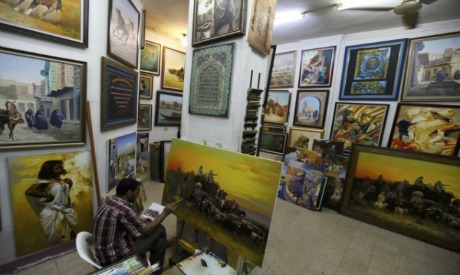
Iraqi artist Ahmed al-Khazali paints in his workshop at a gallery in Baghdad's Karrada district (Photo: Reuters)
In a compound ringed with barbed wire in Baghdad, a small group of Iraqi artists gather to sip tea and soft drinks in the shady patches of a walled garden.
For artist Qasim Sabti, who runs the adjoining private gallery, the intimacy of the scene is familiar. Baghdad's cultural community is dwindling and confining itself to refuges like this one as violence rises in the city, he said.
Baghdad was named the 2013 Arab Capital of Culture by the Arab League, but the worst wave of bombings in Iraq in five years is taking its toll on public activities of all kinds, especially in the capital.
"We were dreaming that the Arab festival would help Baghdad become a centre of Arab culture again. But the dream did not come true," Sabti said.
Eighteen months since U.S. troops withdrew from Iraq, suicide attackers wearing explosives or planting bombs in cars have increasingly targeted public spaces such as cafes and sports events.
Sabti's gallery now sees only one or two visitors a month in a district where there have been frequent bomb attacks.
The violence, and more than two years of civil war in neighbouring Syria, has aggravated deep-rooted sectarian divisions. As public life and opportunities to socialise shrink, communities are even more divided, Sabti says.
"Iraqi society is a mosaic - you can see all of the colours," he said, referring to the different religious and ethnic backgrounds of the population. "Now the picture is disappearing, it is broken."
Plans for the cultural capital festivities started more than two years ago during a time of relative calm when restaurant openings and concerts led to a revival in entertainment.
The government has held a few events this year, including concerts and exhibitions, but there has been little advertising and limited participation.
Down the road from Sabti's gallery, at Baghdad's Academy of Fine Arts, student filmmaker Omar Yaseen talks about how limited public space has restricted his work.
"The roads are blocked, blast walls are back in the street and this means that there is a shrinking of space in the capital," the 22-year-old said in the fortified campus garden. "We wish it would become stable and safe again and to see Baghdad as a capital without cement walls."
The monthly toll of Iraqis killed has risen at times this year to the highest since inter-communal bloodletting peaked in 2006-07, raising concerns of a return to civil war. Police have ramped up security, with extra checkpoints and restrictions on movement.
The security measures are especially difficult for Yaseen, who wanted to shoot a film for his graduation project. He had to beg for permission from authorities to use his video camera in a city where any electronic device is viewed as suspicious.
"In Baghdad, the camera is just like a weapon," said Yaseen, who has been stopped many times at checkpoints. "Unfortunately I worry about getting approval for filming before I even think of ideas for the movie."
APATHY, OFFICIAL NEGLECT
The number of students making their way through the blast walls to the academy has fallen off in the past six months, said ceramics artist Mahir Samarrai, who teaches there.
Some of his students have given up their artistic ambitions and moved away, he said. One went to the stable northern region of Iraqi Kurdistan to work at a hotel for a good salary after failing to make ends meet in Baghdad.
"When he came for his graduation photo, I saw him in a beautiful suit and shoes," he said.
Like many people involved in the arts, he sees apathy as the biggest problem.
"The majority of people don't care for art, for theatre, because they do not see it as important now," he said. "The most important things for them are food and just living."
Iraq has a long history in the arts, particularly sculpture, a staple of artistic life here since ancient times. In the Islamic period, Iraq's cities were famous centres of poetry and manuscript illustration.
Gallery owners and art collectors in the region say some of the most exciting contemporary pieces in the Middle East come from Iraqi artists, such as Hanaa Malallah or Halim al-Karim, but most are working abroad in Europe or the United States.
The Baghdad-based Society of Plastic Artists, a non-governmental group, has only 1,200 members left compared to the 4,000 it had 10 years ago, artist Sabti said. Many members have moved to Iraqi Kurdistan or left Iraq completely.
The lack of state support in a country struggling to build roads and schools has played as big a role as the violence in driving artists away, former culture minister Mufid al-Jazairi said.
Under Saddam Hussein, the government commissioned paintings and sculptures, and funded orchestras and theatres, to glorify the nation and its ruler, but punished those who questioned the status quo. Since then official support has largely dried up.
"It was the 'Ministry of Anti-Culture' under Saddam, now culture is just being ignored," said Jazairi, who runs the Iraqi Cultural Support Association.
The government also comes under pressure from some clerics who say enjoyment of the arts is sinful, he said. Conservative religious parties have risen in power in Iraq since the fall of Saddam in 2003.
"They are influenced by religious people who look at culture in a negative way," Jazairi said.
The difficult conditions may have had one positive effect by creating solidarity in the artistic community, however.
Zahra Abdul Kareem, an art student at the academy, says one of her teachers plays Beethoven in class to soothe the nerves of students after their difficult journeys through the capital.
"We cooperate with each other and try to create an environment that helps us work," she said. "Sometimes we face blasts and killings but despite all that we are determined to move on and attend here."
Short link: